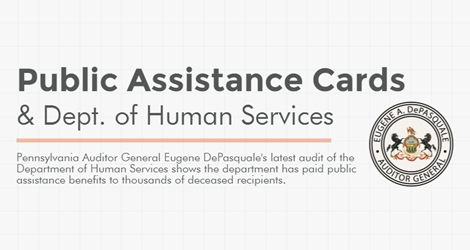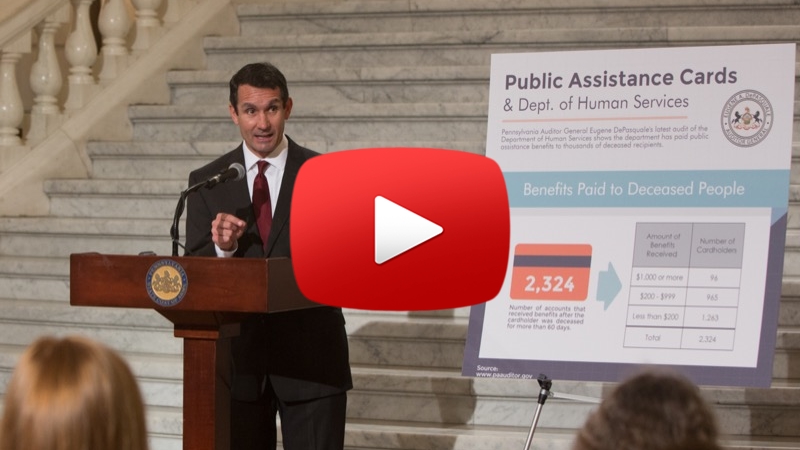Auditor General DePasquale Says DHS Must Stop Putting Public Assistance Benefits on ACCESS Cards Associated with Deceased People
Audit prompts policy change, other improvements, but more needs to be done
Auditor General DePasquale Says DHS Must Stop Putting Public Assistance Benefits on ACCESS Cards Associated with Deceased People
Audit prompts policy change, other improvements, but more needs to be done
HARRISBURG (Sept. 29, 2016) – Auditor General Eugene DePasquale today said his latest audit shows that over a 12-month period the Department of Human Services (DHS) paid public assistance benefits to 2,324 deceased Electronic Benefits Transfer (EBT) cardholders’ accounts.
“Americans have big hearts and clearly some people need assistance. However, when someone gets money that they should not, it hurts those who need it and taxpayers. With state budget dollars strained it is critical to get this right,” DePasquale said during a news conference in the Capitol rotunda.
“While there can be a reasonable dispute about how much money or how many people received benefits after death. What is beyond dispute is that the state needs to do everything in its power to stop it from ever happening again to ensure that the benefits are available to those who truly need, and are clearly eligible to receive them,” he said.
“When a person receiving benefits dies, the benefits should stop. Period.”
EBT cards, also known as ACCESS cards, provide public assistance recipients with electronic access to their benefits from a variety of programs, including Temporary Assistance for Needy Families, the Supplemental Nutrition Assistance Program (SNAP) and employment-related expenses.
The audit includes five findings and 25 recommendations for improvement. While DHS disagrees with some of the audit’s five findings, agency officials expressed agreement with many of the recommendations. The agency’s 11-page response is found on page 43 of the report.
2,324 cardholders’ accounts receive benefits after death
When auditors examined DHS data on EBT benefits paid via ACCESS cards between July 2013 and June 2014 and cross-matched the cardholders’ information against the Pennsylvania Department of Health’s death file, they found 2,324 individuals with exact matches for name, date of birth and Social Security Number to people who had been dead at least 60 days. In total, those 2,324 individuals received $693,161 during the 12-month period reviewed.
Not only does DHS continue to put dollars on the cards assigned to individuals who have died, it often fails to detect use of those dollars.
“We know this is happening because we dug deeper into 30 of the 2,324 cases where deceased cardholder accounts received benefits after their death," DePasquale said.
Two-thirds of those 30 cases were single-person households where auditors found:
• 11 had no benefits spent after the date of death,
• 9 had benefits ranging from $601 to $1,945 spent after the date of death.
“In one of the cases we found a cardholder who died on May 1, 2013, continued to receive $200 per month placed on their EBT card through September,” DePasquale noted. “Then, over a 22-day period in December 2013 and January 2014, nearly $800 in purchases were made with that card.
“What makes this case even more outrageous is that DHS did not refer this inappropriate activity to the state inspector general until we brought it to their attention in July — more than two years after the theft.”
Audit brings policy change
“Because of our audit, DHS changed its policy on Aug. 24, 2016 — two weeks after receiving our draft report — to require caseworkers to take immediate action when they receive a notification of a recipient’s death.
“That policy change is a direct result of our audit, and now brings DHS better in line with the Code of Federal Regulations updated in 2012 that requires all states to ‘establish a system to verify and ensure that benefits are not issued to individuals who are deceased,’” he said.
“This is a clear example of why our audits matter,” DePasquale said. “When we shine a spotlight on flaws in the systems, changes get made that improve the process and save taxpayer money.”
Out-of-state EBT card use
“While federal regulations permit use of EBT cards in other states, I commend DHS’ improved efforts to monitor out-of-state card use, which led to closing the accounts of more than 15,000 recipients and avoiding benefit payments of $22.1 million between 2012 and 2015,” DePasquale said. “That is a huge improvement from previous audits that found little or no monitoring of out-of-state card use.”
Auditors analyzed out-of-state activity in 2013, 2014 and 2015 and found activity each year exceeded $70 million, which is about 2 percent of the approximately $3.4 billion distributed through EBT cards each year.
Federal regulations require states to make EBT cards operational in all states. Analysis shows that over the three years, Pennsylvania EBT cards:
• Were used in all 50 states, two territories and the District of Columbia.
• 75 percent of out-of-state activity was in the six adjacent states.
• Of card activity in non-adjacent states, the most — more than $14 million — was spent in Florida, followed by $6 million in North Carolina; $97,575 in Hawaii; and $45,262 in Alaska.
“Due to the volume of out-of-state use, we strongly encourage DHS to do more to monitor the frequency and appropriateness of such use,” DePasquale said. “Our auditors found DHS’ current process for monitoring of out-of-state questionable activity is hampered by software limitations,” he said, noting that DHS has not substantially revised its process since it started monitoring out-of-state use in 2012.
Using a comprehensive software package would provide DHS additional robust features better designed for the type of data analysis the department is performing using Excel and a database. This would allow DHS to potentially identify any additional questionable out-of-state card activity.
No accountability for authorized representatives
Cardholders who need assistance due to physical or mental disabilities are permitted to designate an “authorized representative” to obtain EBT benefits on their behalf.
EBT cardholders are required to sign documents that outline the rights and responsibilities of using public assistance benefits. Recipients are informed of the prohibitions and penalties for misuse, including fines, prison or both.
However, auditors found that DHS does not require authorized representatives to review or sign any such document on the rights and responsibilities of using the benefits.
“In our 12-month review, there were approximately 5,600 EBT cardholders using authorized representatives, who withdrew approximately $8.9 million in benefits,” DePasquale said. “We did not review these cases for potential fraud, but that is a lot of money being spent by people who may not know the restrictions on the cards.
“More importantly, auditors discovered that the inspector general is precluded from investigating and pursuing criminal charges against authorized representatives because DHS does not require them to review and sign the same information as cardholders.
“It’s ludicrous that a common-sense change in process that will increase accountability has not yet been made,” he said, noting that DHS has no way of knowing if the authorized representatives are appropriately using the benefits for the cardholders, who are often the most vulnerable recipients.
Improved handling of blank EBT/ACCESS cards
Auditors also followed up on three deficiencies identified in the 2014 interim report. DHS resolved issues related to the:
• Independence by on-site monitoring reviewers, and
• Inventory procedures for blank EBT/ACCESS cards, including implementing in 2015 an improved inventory system recommended in the interim audit report.
Regarding the review of EBT logs in county assistance offices (CAO), auditors reviewed logs from two CAOs for a two-week period and found logs for one of the CAOs were not accurately completed and all deficiencies were not detected and reported.
“Following each of our audits, DHS continues to make incremental progress to improve its oversight of the distribution and use of public assistance benefits,” DePasquale said. “I commend DHS officials for their ongoing cooperation and interest in making changes to address issues our audits uncover.
“I expect DHS to go above and beyond what is required by federal regulations when it is in the best interest of taxpayers and the recipients who need assistance,” DePasquale said.
The 114-page special performance audit of the Department of Human Services’ Electronic Benefits Transfer Cards is available online at: www.PaAuditor.gov.
# # #
Return to search results
